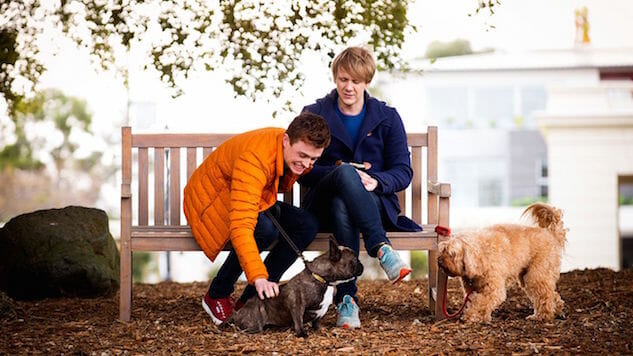Please Like Me Delivers Its Best Season Yet
Hulu
After watching the opening moments of Please Like Me’s Season Four premiere, you’d be forgiven for thinking that Josh Thomas’ comedy had created its gayest episode yet. You would also be correct. Lovable neurotic Josh (played by Thomas himself) is at a gay club, gleefully singing along as a trio of drag queens lip sync to Enya’s “Orinoco Flow (Sail Away).” When Josh’s boyfriend, Arnold (Keegan Joyce) catches up with him, he has a beautiful young man in tow. “We kissed!” he beams. Following the necessary pleasantries, the three boys are next seen in Josh’s bedroom, taking off their clothes. The awkward threesome that follows, in which lanky, mop-haired Josh is the much-ignored third-wheel, is a perfect introduction to the show’s signature, cringe-worthy hilarity (“Well, I sort of tried to wiggle in the middle but that was hard so then I laid there alone but nobody noticed”). But it’s also an early indication of how the latest season of this Aussie show is as razor-sharp an examination of contemporary gay male intimacy as you’re likely to find on mainstream television.
Season Four, which is now available to stream on Hulu after the series’ usual American network (and co-producing partner), Pivot, went under last year, is the best in its short history. What was once a belated addition to the show’s core (Thomas’ coming out coincided with him developing the series) has now become a crucial aspect of its sensibility. Whether using a RuPaul song to score a quiet moment of self-reflection on a bus or mining Josh’s anxieties about what it means to grow old as a gay man who has no interest in having children, Please Like Me has grown into a delightfully assured series that skirts the line between being a “gay show” and “a show about gay people,” without really seeing either of those things as necessary labels to be boxed in by.
With their slice-of-life approach, the best Please Like Me episodes can feel like keenly observant character sketches. There’s a tightness to the series’s episodic breakdown that values character vignettes over a more belabored, serialized storytelling. The series is almost Seinfeld-ian in its plotting, with little more than “Josh and his friends go camping” or “Josh tries his hand at using dating apps” anchoring individual episodes. The time we spend with these characters, in restaurants and bars, in the kitchen and the bedroom, feels all the more, for lack of a better word, authentic.
-

-

-

-

-

-

-

-

-

-

-

-

-

-

-

-

-

-

-

-

-

-

-

-

-

-

-

-

-

-

-

-

-

-

-

-

-

-

-

-








































